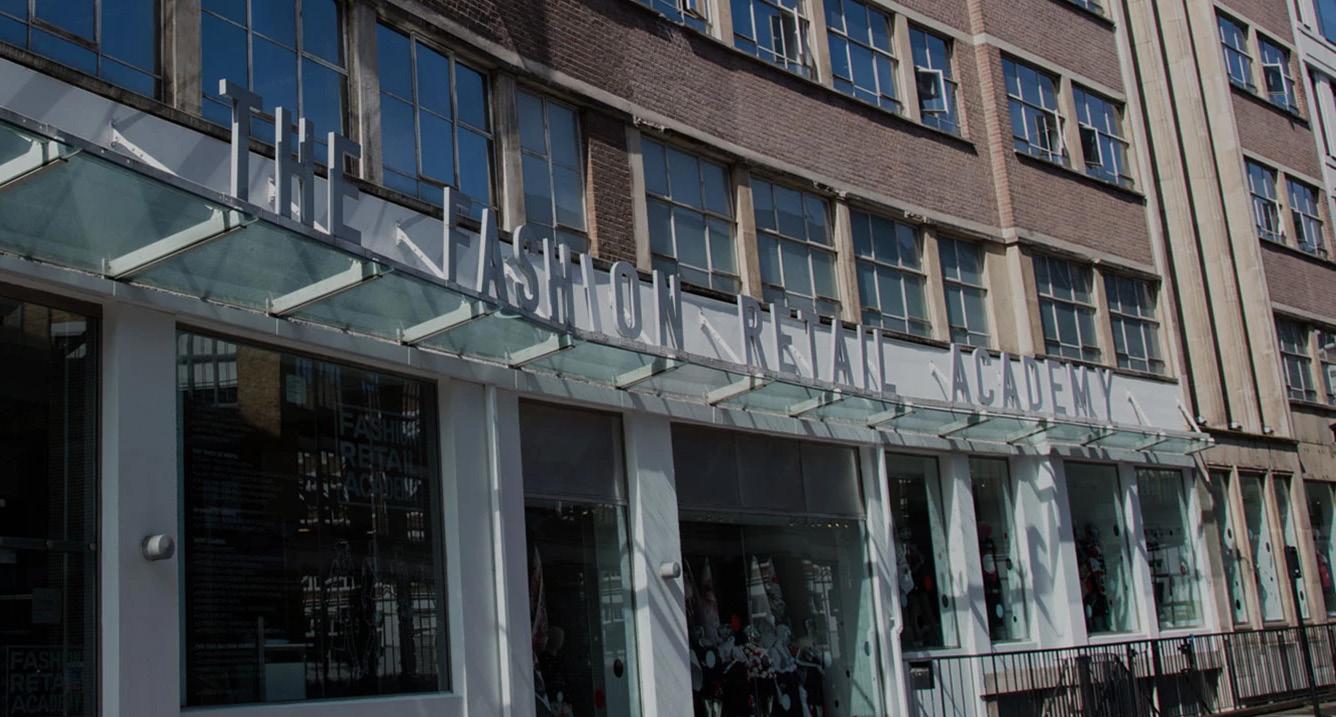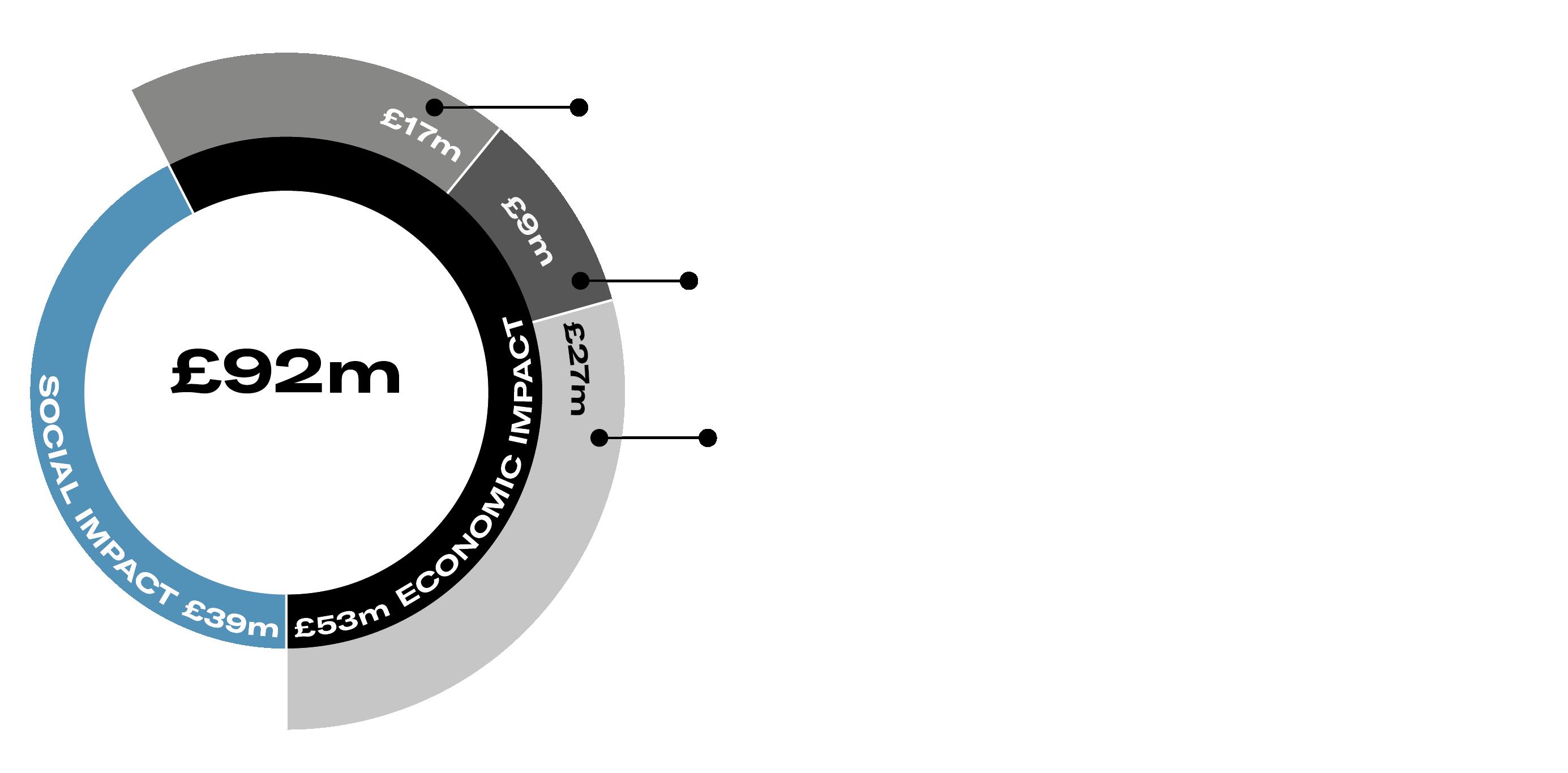










The Fashion Retail Academy (FRA) was founded by the fashion and retail industry to develop the necessary skills and talent required to fulfil entry level roles within the sector. Whilst this has always been the key objective of the FRA, supporting students to develop their skills and educational attainment has been fundamental to ensure that the Fashion and Retail Industry remains an attractive career choice for future generations.
During 2021/22 the FRA has generated £92m in social value by:
• The social impact of the courses the FRA delivered to students
• The social impact of the Wellbeing Services delivered to students
• The financial support provided to students through the Bursary Scheme
• The social and economic impact of students that gain employment after successfully completing an FRA course
• The social and economic impact created through employing staff
• The economic impact of FRA spending on local supply chains to help run the services
This means that for every £1 spent by the Fashion Retail Academy we are generating a £6.92 Social Value.
The FRA has continued to maintain considerable social impact from the previous year 2020/21. In 2021/22 the UK faced additional challenges such as the rising costs of living impacting on the global economy and major concerns regarding climate change
In 2020/21 the FRA reported a social impact ratio of £7.18 for every £1 invested. This has now decreased to £6.92 due to the restrictive measures of social distancing through the Covid Pandemic which ended in mid-2022.

The wider challenges faced by the Fashion and Retail Industry have also significantly contributed to the uncertainty of the Fashion and Retail as more retailing is done online and through e-commerce and social media platforms.
In 2021/22 the FRA has adapted to the needs of learners by providing more flexible and hybrid learning opportunities to ensure that they succeed in acquiring they skills they need as the UK recovers from the pandemic. Alongside this the FRA has begun to adapt its learning opportunities courses to meet the needs of the future of the Fashion and Retail Industry as more consumers moved to online and digital retailing platforms.

This is the FRA baseline year what the first social impact report was completed.
This is the second FRA social impact report which shows a significant improvement from 2019/20 despite the impact of the Covid Pandemic. The FRA adapted its courses to more flexible and online learning.
The current social impact report for 2021/22 is lower than 2020/21. The reason for this is due to uncertainty of economic recovery for Fashion and Retail, Cost of Living Crisis and reduction in high street retailing to online and e-commerce purchasing.
The Fashion Retail Academy (FRA) was founded in 2005 as a private-public partnership with investment from the fashion and retail industry matched by the public sector funding. The FRA specialises in upskilling young people so that they can progress to a career and succeed in the fashion and retail industry. Courses are offered throughout the academic year ranging from fashion traineeships, diplomas, degrees and apprenticeships.
The FRA provides an accelerated route to a career, by giving students a vocational experience combined with academic learning, to support their entry into employment. The FRA work with over 140 brands to provide access to provide practical experience with industry partners. This can be delivered through either industry masterclasses with partners, live industry projects, work placements, mentoring, workshops & other industry experiences to ensure students meet the current and future needs of the industry. Over 90% of FRA students go on to full time employment or further studies.
FRA founding partners were Arcadia, Marks & Spencer, Next, F&F and Experian.
The FRA was founded in 2005 in partnership with the Government to support the fashion and retail industry. The FRA now work with over 140 brands who support them with a range of different activities which include masterclasses, industry projects, work placements, mentoring and recruitment opportunities.
FRA courses are suitable for all ages and all entry levels, with options of flexible learning to support students. Courses are developed to provide students with a combination of an in-depth knowledge of Fashion and Retail and hands on practical experience of the work environment. The key features of FRA courses include:
• Full time Diploma courses that run from one to two years to provide the necessary accreditations and skills to pursue a career.
• Fast track Diploma courses running over 22 weeks to enable students to gain sustainable employment quicker.
• Apprenticeship programmes which provide work-based learning as well as the qualifications necessary to progress a career in the fashion retail industry.
• Accelerated Degree programmes condensed over two years, saving a third of the time and cost of a traditional degree, whilst providing industry practical experience and support from an Industry mentor throughout the degree.
In more recent years the FRA has also developed additional services to support student wellbeing as part of Covid-19 recovery, including:
• Student wellbeing drop-in service
• Student counselling to support students to deal with a range of personal and emotional issues

• Additional support to students with any safeguarding issues they are experiencing
• Student mentoring, additional learning support and careers advice to support students to make the right choices for their skills development and entry into work
• Financial inclusion services to help more deprived students with grants and bursaries.
Social Value is the financial value given to the outcomes that are experienced by beneficiaries:
• Students that are engaged on courses at all levels – this can include outcomes
• Staff employed to deliver the courses and a range of added value services such wellbeing and financial support, student mentoring and careers advice
• Supporting local supply chains to keep the FRA operational through the FRA courses that we offer.
FRA beneficiaries include the staff that we employ and the students that are engaged on our courses. The outcomes the FRA deliver for students include gaining a qualification, starting their career, progression into employment, increased confidence and self-esteem, raising aspirations or increasing motivation. These outcomes have a monetary value which is captured in the FRA Social Value Reports.

The Fashion and Retail Industry has faced a significant challenge over the past 2 years with the impact of the Covid-19 pandemic and the uncertainty that lockdown measures have had on both employment and the future of the industry.
The industry made significant changes in the face of pandemic by adapting from high street retailing to more online presence through e-commerce platforms. As the UK comes out of lockdown and the economy restarts, the Fashion and Retail industry will start to grow and shape to this new digital future.

Historically, fashion and retail has been led from the Catwalks through advertising and audio and visual media which was then fed to consumers. High street brands would then replicate catwalk trends across different types of consumers based on their spending and buying power.
Today, Fashion and Retail is led by the consumer and their needs which is inspired by social media channels, social media influencers and other online digital marketing and e-commerce platforms. Fashion and retail trends are set by the consumers which don’t necessarily need to be in the traditional advertising and media spotlight which has changed the way in which the Fashion and Retail Industry operates which will be accelerated with the digital transformation between now and 2030 and beyond.
The High Street has changed, many brands have not survived the impact of the Covid pandemic with their ability to:
• Sustain the costs of a high street presence
• Moving to online shopping
• Having a digital and logistic ecosystem to meet consumer demands
• Creating a more ethical supply chain to meet the needs of Gen Z and Gen Alpha consumers.
With the digital transformation across all industries, Fashion and Retail is one of the industries that have been hit the hardest because it is primarily based on the high street shopping experience. In particular, the Covid pandemic has strained High Street retailing as it was not prepared for such a phenomenon. This combined with increasing cost of living, global economic recovery and the concerns for climate change means that the change in consumer behaviour and online retailing is here to stay and will rapidly evolve with future generations.
To meet the needs of future generations, Gen Z, Gen Alpha and future Gen Beta consumers, the FRA will lead the way in reshaping the talent pool required by the Fashion and Retail Industry by developing a strategic approach for the Future of Fashion and Retail by developing the vision and strategy for the future of education and skills to meet the skills required for industry partners in the no so distant future.

The purpose of the Social Value Report is to evidence the social impact and social value that the FRA creates for students, communities, economies and the fashion and retail industry. Most of the work the FRA do has a deliberate, but often times invisible impact on individuals, our industry and our sector.
The key objectives of the FRA is to:
• Change lives through education and learning opportunities in the Fashion and Retail Industry
• Transforms and enhance employment and careers in the Fashion and Retail Industry
• Help businesses to succeed through their talent pool for the future skills required for the Fashion and Retail Industry
• Supports growth to the economy created through the Fashion and Retail Industry
For the industry, the FRA are securing a talent pipeline, ensuring a ready supply of the most skilled new entrants for key roles or further training and developing their existing workforce. For students as beneficiaries, the FRA offers a unique and specialist education that directly propels them towards positive outcomes, be that higher levels of study or employment.
Students travel from across the country to study with the FRA at all ages and life stages. For the fashion and retail industry the FRA delivers inspiration at schools, careers fairs, Saturday Clubs, open days and many other touch points to shine a light on fashion retail careers and dispel the myths that surround the industry.







There are multiple methodologies that are used to understand impact and calculate social, economic and environmental value. These methodologies include:
• Cost Benefit Analysis (CBA) – to understand fiscal savings to Government and benefits to the HM Treasury through the services that the FRA provide.
• Social Return on Investment (SROI) – to understand the impact of the FRA on the wellbeing of students and staff.
• Local Economic Multiplier at 3 Rounds (LM3) – to understand how the FRA spend on staff and suppliers is multiplied in the economy to support local economic growth.
• Gross Value Added (GVA) – to understand the multiplier effects of employment of staff and supporting students to gain employment after gaining qualifications through the FRA.
Each of the methodologies are endorsed by Government and uses data from the HM Treasury Green Book, Unit Cost Database, the Global Value Exchange, Office of National Statistics, HCA Employment Density Guidance, HM Treasury Additionality Guidance.
Theory of change relates to the outcomes experienced by beneficiaries who are either employed by FRA or students on a course delivered by FRA staff. To understand the theory of change, outcomes have been mapped to the benefits experienced by both staff and students. The outcomes are given a proxy value and social impact metrics which is used to calculate the social value.
Learners – Savings to education, health services, increased confidence, increased self-esteem, raising aspirations, motivation and career progression
Staff and employees – Reduction in welfare benefits, increased earnings and revenue benefits, increased productivity, increased confidence, increased self-esteem, raising aspirations, motivation and career progression.
Learners moving to employmentproductivity, increased confidence, increased self-esteem, raising aspirations, motivation and career progression.
Learners using the Wellbeing Services –improving educational attainment and supporting mental health of students during the impact of Covid-19.
Students having access to Bursaries – providing support to students who are struggling financially with maintaining their studies

Each of the outcomes identified in the theory of change has a proxy value attached to it which is the unit value for delivering the outcome. Standardised impact metrics are then applied to calculate the value for each outcome which makes up the total social impact created.
Within the calculations, the impact metrics are required to carry out social value calculations. There are a number of key impact measures that are used when calculating social value:
• Deadweight – What would have happened anyway regardless of the project?
• Attribution – How much have you contributed to the delivery of the outcomes through your services
• Displacement – Were there any negative impacts as a result of your project?
• Drop-off and Discounting - How much of that value still belongs to the organisation’s activity? Do the outcomes drop off with time? Where outcomes last more than one year a drop off rate of 10% and the HM Treasury Discount Rate of 3.5% is used to calculate the Net Present Value (NPV).
Additionality Impact metrics are percentages that are taken away from the proxy values for each outcome in the Theory of Change to avoid over-claiming the value.
The FRA is an employing organisation that delivers courses to our student beneficiaries to develop their skills for the Fashion and Retail industry, therefore the FRA creates social value from both their operational activities as well as the services we deliver.
Based on the 120 staff that we employed and the 1719 students that were engaged on our courses in 2021/2022 we generated £39m social impact and £51m economic impact in 2019/20.
The £39m social impact is made up of two key elements:
1. Social Impact of Staff Delivery and Student Learning
2. Support provided to students through the Wellbeing Services Fiscal savings to government through reduced welfare benefits, increased skills, educational attainment and reduced impact on health


Wellbeing benefits including confidence, self-esteem, aspirations, motivation, job-related skills and career progression

The outcomes experience by staff and students through the courses delivered accounts for £36.5m social impact which is made up of:
• £7m Fiscal saving to Government through reduced welfare benefits, increased skills, educational attainment and reduced impact on health.
• £12m HMRC benefits through Tax, NI payment and earnings.
• £17.5m Wellbeing benefits including confidence, self-esteem, aspirations, motivation, job-related skills and career progression
In 2021/2022, the FRA provided several support services to student to support their wellbeing. The Wellbeing Services delivered by the FRA account for over £2.5m additional social impact by supporting students with issues such as social isolation, additional mentoring, safeguarding and financial inclusion related to the negative impacts of the Covid pandemic.
The social impact of the FRA in 2021/22 is a total of £36.5m for staff delivery and student learning, and £2.5m created through the wellbeing services. The combined social impact for 2021/22 is £39m.


£2.5m Wellbeing Support Services for students with mental health issues, financial difficulty, safeguarding and additional mentoring needs

The economic impact of the FRA is £53m which created from both the spend on our staff and suppliers which is multiplied in the economy, and the multiplier effect of direct employment, and the learners we have supported to progress into employment.
Spend on staff and suppliers multiplied in the economy is known as an LM3 calculation (Local Multiplier of 3 rounds of spending). This is based on:
Round 1 - FRA’s turnover
Round 2 - what is spent on staff and suppliers
Round 3 - what staff and suppliers spend in their local area on the cost of living and suppliers having a business presence in the UK.
The indirect and induced effect of direct employment that creates productivity in the economy is known as a Gross Value Added (GVA) calculation. GVA accounts for where someone is employed, other people are also employed indirectly or induced to either support them to deliver their role or to provide the services they need to live.

£17m is created in economic impact through spend on employment and suppliers multiplied in the economy to support economic growth.

£9m is created through productivity in the economy from employment of FRA staff.
£27m is created through productivity in the economy from learners moving to employment.
During 2021/2022, the Fashion Retail Academy has generated £92m in social value through the courses they provide to student, the wellbeing services to support students, and the social and economic impact of employing staff and supporting students to gain sustainable employment. This means that for every £1 spent by the Fashion Retail Academy we are generating a £6.92 Social Value. The decrease in social value loss primarily due to the impact of the Covid Pandemic, Cost of Living Crisis on a global scale and more social conscious purchasing behaviour by consumers through more awareness of sustainability and climate change.
The FRA will continue to monitor their Social Value and produce an annual Social Value Report.



